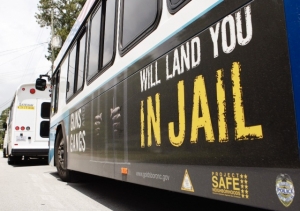City puts its money where the buses are
By John Joyce
Published in News on June 25, 2013 1:46 PM

News-Argus/CASEY MOZINGO
Goldsboro spent more than $2,500 on three bus wraps, like the one seen here, warning citizens of the consequences of violent crime. The signs are part of the Goldsboro Partners Against Crime initiative and will remain on the buses for at least a year.
The city of Goldsboro wants to get the message across that it will not tolerate violent crime. So the Goldsboro City Council took out an ad.
The city paid $2,586 to design, obtain and install three bus wraps that display images of a person behind bars and message about the consequences of crime.
The signs read: "Guns and Gangs Will Land You in Jail."
The wraps on GATEWAY buses will be visible around the city for at least a year, City Manager Scott Stevens said.
City officials said the slogan is not just tough talk. They intend to see the warning is backed up by action.
"We wanted to get the message across to the people that needed to see it most, the youth," Stevens said.
The move was another part of the Goldsboro Partners Against Crime and national Project Safe Neighborhoods programs adopted by the city over the last year.
Another facet of the program has violent offenders and people identified by police or probation officers as having the potential to continue committing violent crimes being called in for face-to-face notifications from law enforcement officials that they had better stop or face stiffer sentences, possibly in the federal system.
"We've had a better year so far this year than last," Stevens said.
Still, the city manager was hesitant to attribute that success entirely to the GPAC program, although he did add that the money approved for the program last year was made a permanent part of the city budget.
The first call-in of repeat offenders was in March.
The next is scheduled for July.
It is too soon to tell if the program is working, he said.
"It is going to take a 5- to 10-year look back to tell what the real impact of GPAC has been on the city," Stevens said.
